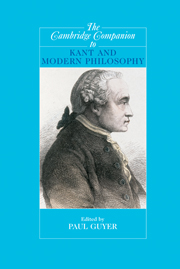Book contents
- Frontmatter
- Introduction: The starry heavens and the moral law
- 1 “A Priori”
- 2 Kant on the perception of space (and time)
- 3 Kant’s philosophy of mathematics
- 4 Kant on a priori concepts: The metaphysical deduction of the categories
- 5 Kant’s philosophy of the cognitive mind
- 6 Kant’s proofs of substance and causation
- 7 Kant and transcendental arguments
- 8 The critique of metaphysics: The structure and fate of Kant’s dialectic
- 9 Philosophy of natural science
- 10 The supreme principle of morality
- 11 Kant on freedom of the will
- 12 Mine and thine? The Kantian state
- 13 Kant on sex and marriage right
- 14 Kant’s theory of peace
- 15 Kant’s conception of virtue
- 16 Kant’s ambitions in the third Critique
- 17 Moral faith and the highest good
- 18 Kant’s critical philosophy and its reception - the first five years (1781-1786)
- Bibliography
- Index
4 - Kant on a priori concepts: The metaphysical deduction of the categories
Published online by Cambridge University Press: 28 March 2007
- Frontmatter
- Introduction: The starry heavens and the moral law
- 1 “A Priori”
- 2 Kant on the perception of space (and time)
- 3 Kant’s philosophy of mathematics
- 4 Kant on a priori concepts: The metaphysical deduction of the categories
- 5 Kant’s philosophy of the cognitive mind
- 6 Kant’s proofs of substance and causation
- 7 Kant and transcendental arguments
- 8 The critique of metaphysics: The structure and fate of Kant’s dialectic
- 9 Philosophy of natural science
- 10 The supreme principle of morality
- 11 Kant on freedom of the will
- 12 Mine and thine? The Kantian state
- 13 Kant on sex and marriage right
- 14 Kant’s theory of peace
- 15 Kant’s conception of virtue
- 16 Kant’s ambitions in the third Critique
- 17 Moral faith and the highest good
- 18 Kant’s critical philosophy and its reception - the first five years (1781-1786)
- Bibliography
- Index
Summary
In Chapter One of the Transcendental Analytic in the Critique of Pure Reason, Kant establishes a table of the categories, or pure concepts of the understanding, according to the “leading thread” of a table of the logical forms of judgment. He proclaims that this achievement takes after and improves upon Aristotle's own endeavor in offering a list of categories, which Aristotle took to define the most general kinds of being. Kant claims that his table is superior to Aristotle's list in that it is grounded on a systematic principle. This principle is also what will eventually ground, in the Transcendental Deduction, the a priori justification of the objective validity of the categories: a justification of the claim that all objects (as long as they are objects of a possible experience) do fall under those categories.
Kant's self-proclaimed achievement is the second main step in his effort to answer the question: “How are synthetic a priori judgments possible?” The first step was the argument offered in the Transcendental Aesthetic, to the effect that space and time are a priori forms of intuition. As such, Kant argued, they make possible judgments (propositions) whose claim to truth is justified a priori by the universal features of our intuitions. Such propositions are thus both synthetic and a priori.
- Type
- Chapter
- Information
- The Cambridge Companion to Kant and Modern Philosophy , pp. 129 - 168Publisher: Cambridge University PressPrint publication year: 2006
- 6
- Cited by



